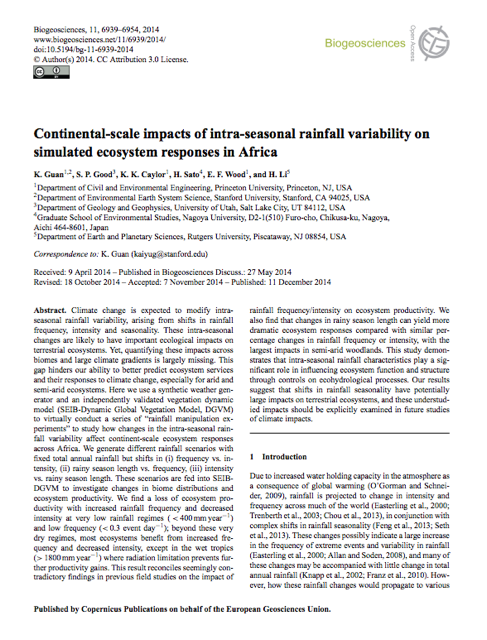Continental-scale impacts of intra-seasonal rainfall variability on simulated ecosystem responses in Africa

Guan, K., Good, S. P., Caylor, K. K., Sato, H., Wood, E. F., and Li, H.: Continental-scale impacts of intra-seasonal rainfall variability on simulated ecosystem responses in Africa, Biogeosciences, 11, 6939-6954, doi:10.5194/bg-11-6939-2014, 2014.
Climate change is expected to modify intra-seasonal rainfall variability, arising from shifts in rainfall frequency, intensity and seasonality. These intra-seasonal changes are likely to have important ecological impacts on terrestrial ecosystems. Yet, quantifying these impacts across biomes and large climate gradients is largely missing. This gap hinders our ability to better predict ecosystem services and their responses to climate change, especially for arid and semi-arid ecosystems. Here we use a synthetic weather generator and an independently validated vegetation dynamic model (SEIB-Dynamic Global Vegetation Model, DGVM) to virtually conduct a series of “rainfall manipulation experiments” to study how changes in the intra-seasonal rainfall variability affect continent-scale ecosystem responses across Africa. We generate different rainfall scenarios with fixed total annual rainfall but shifts in (i) frequency vs. intensity, (ii) rainy season length vs. frequency, (iii) intensity vs. rainy season length. These scenarios are fed into SEIB-DGVM to investigate changes in biome distributions and ecosystem productivity. We find a loss of ecosystem productivity with increased rainfall frequency and decreased intensity at very low rainfall regimes (<400 mm year −1 ) and low frequency (<0.3 event day −1 ); beyond these very dry regimes, most ecosystems benefit from increased frequency and decreased intensity, except in the wet tropics (>1800 mm year −1 ) where radiation limitation prevents further productivity gains. This result reconciles seemingly contradictory findings in previous field studies on the impact of rainfall frequency/intensity on ecosystem productivity. We also find that changes in rainy season length can yield more dramatic ecosystem responses compared with similar percentage changes in rainfall frequency or intensity, with the largest impacts in semi-arid woodlands. This study demonstrates that intra-seasonal rainfall characteristics play a significant role in influencing ecosystem function and structure through controls on ecohydrological processes. Our results suggest that shifts in rainfall seasonality have potentially large impacts on terrestrial ecosystems, and these understudied impacts should be explicitly examined in future studies of climate impacts.
